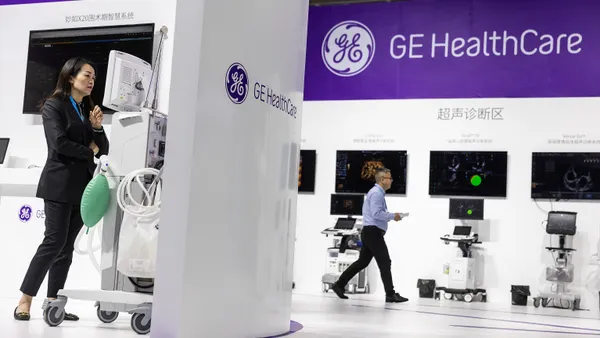Dive Brief:
- FDA has approved an implantable, rechargeable sacral neuromodulation (SNM) system to treat fecal incontinence, manufacturer Axonics Modulation Technologies announced Monday. The device stimulates sacral nerves, located in the pelvic area, to modify their activity and correct erroneous messages, the company said.
- The Irvine, California-based medtech can market the system for use in patients with chronic fecal incontinence who are not candidates for — or have failed — more conservative treatments, FDA said. The agency signed off on Axonics' claims that the device has a 15-year functional life and is safe for patients to undergo full-body MRI.
- The company has an additional PMA filing under review for overactive bladder and urinary retention indications, which Axonics said it expects a determination on "in the near term," likely by October.
Dive Insight:
The approval allows Axonics, which raised $120 million in an IPO last fall, to compete with Medtronic, which has dominated the sacral neuromodulation market with its InterStim product line. Compared to Medtronic's product, currently marketed for bowel and urinary control, Axonics' product advantages include a longer product life and better MRI compatibility (Medtronic's is currently only safe for head MRIs), according to Needham analysts' Sept. 3 note to investors.
"[W]e believe the market opportunity for Axonics goes well beyond the existing approximately $650 million of revenue that is currently being generated by the incumbent’s non-rechargeable SNM device," CEO Raymond Cohen said in a statement Monday.
That would be a big jump for Axonics, which generated $1.5 million in international revenue last quarter. Axonics received a CE mark for its device to treat overactive bladder, fecal incontinence and urinary retention in June 2016. It received a marketing license from Health Canada in January 2017 and was approved by Australian regulators in January 2018. Last year, the company recorded a $32.5 million net loss as sales of the SNM system in Europe and Canada generated $700,000 in revenue for the year.
This summer, the company reported one-year, top-line clinical results from its 129-patient, unblinded pivotal trial of the device for treating urinary urge incontinence. Patients were implanted with a tined lead and the Axonics miniaturized rechargeable neurostimulator, the company said, and 89% of implanted subjects responded to the therapy at one year. No adverse events were reported.
Axonics plans to begin shipping products in the U.S. in the fourth quarter. Its domestic sales force numbers 145 sales reps, regional managers and clinical specialists, Cohen said.
The Needham analysts told investors Axonics has a strategy of targeting the approximately 1,000 doctors that perform roughly 80% of all SNM implant procedures. "Given the full commercial organization and targeted strategy, we believe AXNX can take significant market share in the first full year" of its launch, the analysts wrote, predicting Axonics can reach profitability in the fourth quarter of 2021, with full-year profitability likely in 2022.
More than 5.5 million Americans have fecal incontinence, the American College of Gastroenterology estimates, but Axonics management said on a conference call with investors Monday morning the condition is under-reported. Other treatment options may include medication, muscle exercises, or surgical repair of the anal sphincter muscle.
"There's no reason" why physicians implanting these devices "can't at least double the number of procedures" they're doing, management told investors on a conference call Monday morning.
Medtronic executives said on an Aug. 20 earnings call the company plans to launch a smaller, rechargeable version of InterStim II in the U.S. in late fiscal year 2020 or early fiscal year 2021.
Shares in Axonics were up more than 3% in early trading Monday.












